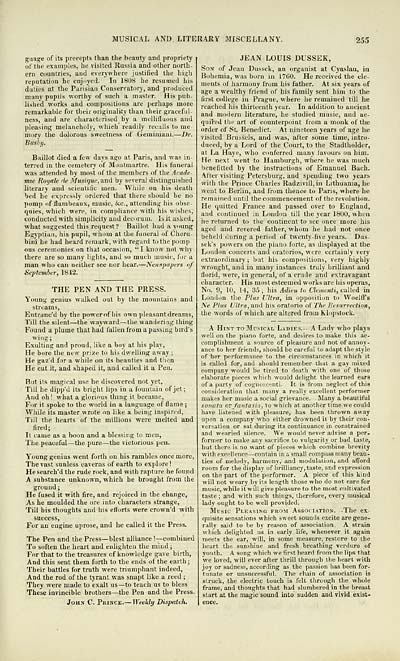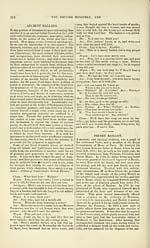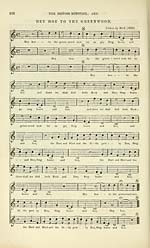Glen Collection of printed music > Printed music > British minstrel, and musical and literary miscellany
(263) Page 255
Download files
Complete book:
Individual page:
Thumbnail gallery: Grid view | List view

MUSICAL AND LITERARY MISCELLANY.
255
guage of its precepts than the beauty and propriety
oftiie examples, be visited Russia and other north-
ern countries, and everywhere justitied the high
reputation he enjoyed. In 1808 he resumed his
duties at the Parisian Conservatory, and produced
many pupils worthy of such a master. His pub-
lished works and compositions are perhaps more
remarkable for their originality than their graceful-
ness, and are characterised by a mellifluous and
pleasing melancholy, which readily recalls to me-
mory the dolorous sweetness of Geminiaui. — Dr.
Busily.
Baillot died a few days ago at Paris, and was in-
terred in the cemetery of Montmartre. His funeral
was attended by most of the members of the Acade-
mic Royale de Musique,a.nd by several distinguished
literary and scientilic men. While on his death
bed he expressly ordered that there should be no
pomp of flambeaux, music, &c., attending his obse-
quies, which were, in compliance with his wishes,
conducted with simplicity and decorum. Is it asked,
what suggested this request ? Baillot had a young
Egyptian, his pupil, whom at the funeral of Cheru-
bini he had heard remark, with regard to the pomp
ous ceremonies on that occasion, " I know not why
there are so many lights, and so much music, for a
man who can neither see nor hear. — Newspapers of
September, 1842.
THE PEN AND THE PRESS.
Young genius walked out by the mountains and
streams,
Entranc'd by the power of his own pleasant dreams,
Till the silent — the wayward — the wandering thing
Found a plume that had fallen from a passing bird's
wing;
Exulting and proud, like a hoy at his play.
He bore the new prize to his dwelling away ;
He gaz'd for a while on its beauties and tlien
He cut it, and shaped it, and called it a Pen.
But its magical use he discovered not yet,
Till he dipp'd its bright lips in a fountain of jet;
And oh! what a glorious thing it became,
For it spoke to the world in a language of flame ;
While its master wrote on like a being inspired.
Till the hearts of the millions were melted and
fired;
It came as a boon and a blessing to men,
The peaceful — the pure — the victorious pen.
Young genius went forth on his rambles once more,
The vast sunless caverns of earth to exidore !
He search'd the rude rock, and with rapture he found
A substance unknown, which he brought from the
ground ;
He fused it with fire, and rejoiced in the change.
As he moulded the ore into characters strange.
Till his thoughts and his ettorts were crown'd with
success,
For an engine uprose, and he called it the Press.
The Pen and the Press — blest alliance ! — combined
To soften the heart and enlighten the mind ;
For that to the treasures of knowledge gave birth.
And this sent them forth to the ends of the earth;
Their battles for truth were triumphant indeed,
And the rod of the tyrant was snapt like a reed ;
They were made to exalt us— to teach us to bless
These invincible brothers — the Pen and the Press.
John C. Prince. — Weekly Dispatch.
JEAN LOUIS DUSSEK,
Son of Jean Dussek, an organist at Cyaslau, in
Bohemia, was born in 17G0. He received the ele-
ments of harmony from his father. At six years of
age a wealthy friend of his family sent him to the
first college in Prague, where he remained till he
reached his thirteenth year. In addition to ancient
and modern literature, he studied music, and ac-
quired the art of counterpoint irom a monk of the
order of St. Benedict. At nineteen years of age he
visited Brussels, and was, after some time, intro-
duced, by a Lord of the Court, to the Stadtholder,
at La Haye, who conferred many iavours on him.
He next went to Hamburgh, where he was much
benefitted by the instructi<ms of Emanuel Bach.
Alter visiting Petersburg, and spending two years
with the Prince Charles Radzivill,in Lithuania, he
went to Berlin, and from thence to Paris, where he
remained until the commencement of the revolution.
He quitted France and passed over to England,
and continued in London till the year 1800, when
he returned to the continent to see once more his
aged and revered father, whom he had not once
beheld during a period of twenty-five years. Dus-
sek's powers on the piano forte, as displayed at the
London concerts and oratorios, were certainly very
extraordinary ; but his compositions, very highly
wrought, and in many instances truly brilliant and
florid, were, in general, of a crude and extravagant
character. His most esteemed works are his operas.
No. 9, 10, 14, 35; his Adieu to Cfemcnti, culled in
London tlie Plus Ultra, in opposition to Woelft''s
Ne Plus Ultra, and his oratorio of The liesurrection,
the words of which are altered from Klopstock.
A Hint toMpstcal Ladies.-- A Lady who plays
well on the piano forte, and desires to make this ac-
complishment a source of pleasure and not of annoy-
ance to her friends, should be careful to adapt the style
of her performance to the circumstances in which it
is called for, and should remember th;it a gay mixed
company would be tired to death with one of those
elaborate pieces which would delight the learned ears
of a party of cognoscenti- It is from neglect of this
consideration that many a really excellent performer
makes her music a social grievance. Many a beautiful
sonata or fantasia, to which at another time we could
have listened with pleasure, has been thrown away
upon a company who either drowned it by their con-
versation or sat during its continuance in constrained
and wearied silence. \Ve would never advise a per-
former to make any sacrifice to vulgarity or bad taste,
but there is no want of pieces which combine brevity
with excellence — contain in a small compass many beau-
ties of melody, harmony, and modulation, and afford
room for the display of brilliancy, taste, and expression
on the part of the performer. A piece of this kind
will not weary by its length those who do not care for
music, while it will give pleasure to the most cultivated
taste ; and with such things, therefore, every musical
lady ought to be well provided.
Music Pleasing from Association. -The ex-
quisite sensations which sweet sounds excite are gene-
rally said to be by reason of association. A strain
which delighted us in early life, whenever it again
meets the ear, will, in some measure, restore to the
heart the sunshine and fresh breathing verdure of
youth. A song which we first heard from the lips that
we loved, will ever after thrill through the heart with
joy or sadness, according as the passion has been for-
tunate or unsuccessful. The chain of association is
struck, the electric touch is felt through the whole
frame, and thoughts that had slumbered in the breast
start at the magic sound into sudden and vivid exist-
ence.
255
guage of its precepts than the beauty and propriety
oftiie examples, be visited Russia and other north-
ern countries, and everywhere justitied the high
reputation he enjoyed. In 1808 he resumed his
duties at the Parisian Conservatory, and produced
many pupils worthy of such a master. His pub-
lished works and compositions are perhaps more
remarkable for their originality than their graceful-
ness, and are characterised by a mellifluous and
pleasing melancholy, which readily recalls to me-
mory the dolorous sweetness of Geminiaui. — Dr.
Busily.
Baillot died a few days ago at Paris, and was in-
terred in the cemetery of Montmartre. His funeral
was attended by most of the members of the Acade-
mic Royale de Musique,a.nd by several distinguished
literary and scientilic men. While on his death
bed he expressly ordered that there should be no
pomp of flambeaux, music, &c., attending his obse-
quies, which were, in compliance with his wishes,
conducted with simplicity and decorum. Is it asked,
what suggested this request ? Baillot had a young
Egyptian, his pupil, whom at the funeral of Cheru-
bini he had heard remark, with regard to the pomp
ous ceremonies on that occasion, " I know not why
there are so many lights, and so much music, for a
man who can neither see nor hear. — Newspapers of
September, 1842.
THE PEN AND THE PRESS.
Young genius walked out by the mountains and
streams,
Entranc'd by the power of his own pleasant dreams,
Till the silent — the wayward — the wandering thing
Found a plume that had fallen from a passing bird's
wing;
Exulting and proud, like a hoy at his play.
He bore the new prize to his dwelling away ;
He gaz'd for a while on its beauties and tlien
He cut it, and shaped it, and called it a Pen.
But its magical use he discovered not yet,
Till he dipp'd its bright lips in a fountain of jet;
And oh! what a glorious thing it became,
For it spoke to the world in a language of flame ;
While its master wrote on like a being inspired.
Till the hearts of the millions were melted and
fired;
It came as a boon and a blessing to men,
The peaceful — the pure — the victorious pen.
Young genius went forth on his rambles once more,
The vast sunless caverns of earth to exidore !
He search'd the rude rock, and with rapture he found
A substance unknown, which he brought from the
ground ;
He fused it with fire, and rejoiced in the change.
As he moulded the ore into characters strange.
Till his thoughts and his ettorts were crown'd with
success,
For an engine uprose, and he called it the Press.
The Pen and the Press — blest alliance ! — combined
To soften the heart and enlighten the mind ;
For that to the treasures of knowledge gave birth.
And this sent them forth to the ends of the earth;
Their battles for truth were triumphant indeed,
And the rod of the tyrant was snapt like a reed ;
They were made to exalt us— to teach us to bless
These invincible brothers — the Pen and the Press.
John C. Prince. — Weekly Dispatch.
JEAN LOUIS DUSSEK,
Son of Jean Dussek, an organist at Cyaslau, in
Bohemia, was born in 17G0. He received the ele-
ments of harmony from his father. At six years of
age a wealthy friend of his family sent him to the
first college in Prague, where he remained till he
reached his thirteenth year. In addition to ancient
and modern literature, he studied music, and ac-
quired the art of counterpoint irom a monk of the
order of St. Benedict. At nineteen years of age he
visited Brussels, and was, after some time, intro-
duced, by a Lord of the Court, to the Stadtholder,
at La Haye, who conferred many iavours on him.
He next went to Hamburgh, where he was much
benefitted by the instructi<ms of Emanuel Bach.
Alter visiting Petersburg, and spending two years
with the Prince Charles Radzivill,in Lithuania, he
went to Berlin, and from thence to Paris, where he
remained until the commencement of the revolution.
He quitted France and passed over to England,
and continued in London till the year 1800, when
he returned to the continent to see once more his
aged and revered father, whom he had not once
beheld during a period of twenty-five years. Dus-
sek's powers on the piano forte, as displayed at the
London concerts and oratorios, were certainly very
extraordinary ; but his compositions, very highly
wrought, and in many instances truly brilliant and
florid, were, in general, of a crude and extravagant
character. His most esteemed works are his operas.
No. 9, 10, 14, 35; his Adieu to Cfemcnti, culled in
London tlie Plus Ultra, in opposition to Woelft''s
Ne Plus Ultra, and his oratorio of The liesurrection,
the words of which are altered from Klopstock.
A Hint toMpstcal Ladies.-- A Lady who plays
well on the piano forte, and desires to make this ac-
complishment a source of pleasure and not of annoy-
ance to her friends, should be careful to adapt the style
of her performance to the circumstances in which it
is called for, and should remember th;it a gay mixed
company would be tired to death with one of those
elaborate pieces which would delight the learned ears
of a party of cognoscenti- It is from neglect of this
consideration that many a really excellent performer
makes her music a social grievance. Many a beautiful
sonata or fantasia, to which at another time we could
have listened with pleasure, has been thrown away
upon a company who either drowned it by their con-
versation or sat during its continuance in constrained
and wearied silence. \Ve would never advise a per-
former to make any sacrifice to vulgarity or bad taste,
but there is no want of pieces which combine brevity
with excellence — contain in a small compass many beau-
ties of melody, harmony, and modulation, and afford
room for the display of brilliancy, taste, and expression
on the part of the performer. A piece of this kind
will not weary by its length those who do not care for
music, while it will give pleasure to the most cultivated
taste ; and with such things, therefore, every musical
lady ought to be well provided.
Music Pleasing from Association. -The ex-
quisite sensations which sweet sounds excite are gene-
rally said to be by reason of association. A strain
which delighted us in early life, whenever it again
meets the ear, will, in some measure, restore to the
heart the sunshine and fresh breathing verdure of
youth. A song which we first heard from the lips that
we loved, will ever after thrill through the heart with
joy or sadness, according as the passion has been for-
tunate or unsuccessful. The chain of association is
struck, the electric touch is felt through the whole
frame, and thoughts that had slumbered in the breast
start at the magic sound into sudden and vivid exist-
ence.
Set display mode to: Large image | Transcription
Images and transcriptions on this page, including medium image downloads, may be used under the Creative Commons Attribution 4.0 International Licence unless otherwise stated. ![]()
| Special collections of printed music > Glen Collection of printed music > Printed music > British minstrel, and musical and literary miscellany > (263) Page 255 |
|---|
| Permanent URL | https://digital.nls.uk/91438101 |
|---|
| Description | Scottish songs and music of the 18th and early 19th centuries, including music for the Highland bagpipe. These are selected items from the collection of John Glen (1833 to 1904). Also includes a few manuscripts, some treatises, and other books on the subject. |
|---|
| Description | The Glen Collection and the Inglis Collection represent mainly 18th and 19th century Scottish music, including Scottish songs. The collections of Berlioz and Verdi collected by bibliographer Cecil Hopkinson contain contemporary and later editions of the works of the two composers Berlioz and Verdi. |
|---|

